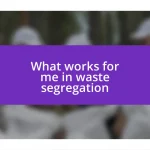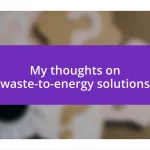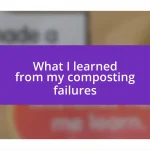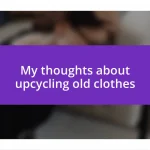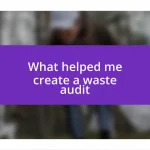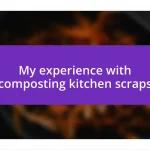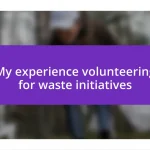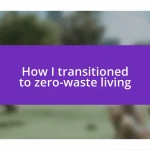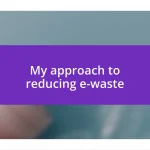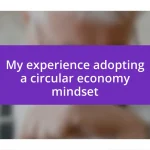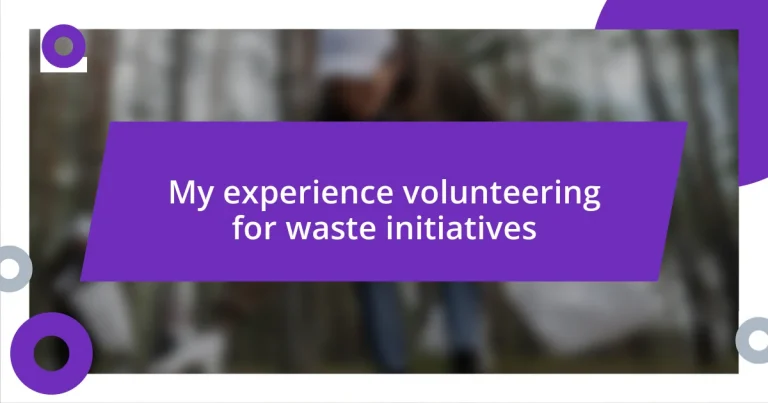Key takeaways:
- Participating in waste initiatives fosters a sense of community, personal growth, and empowerment through collective environmental efforts.
- Choosing the right organization aligns volunteers’ values with mission goals, enhancing the overall volunteering experience and impact.
- Volunteering develops essential skills like teamwork, time management, and effective communication, which contribute to both personal and community development.
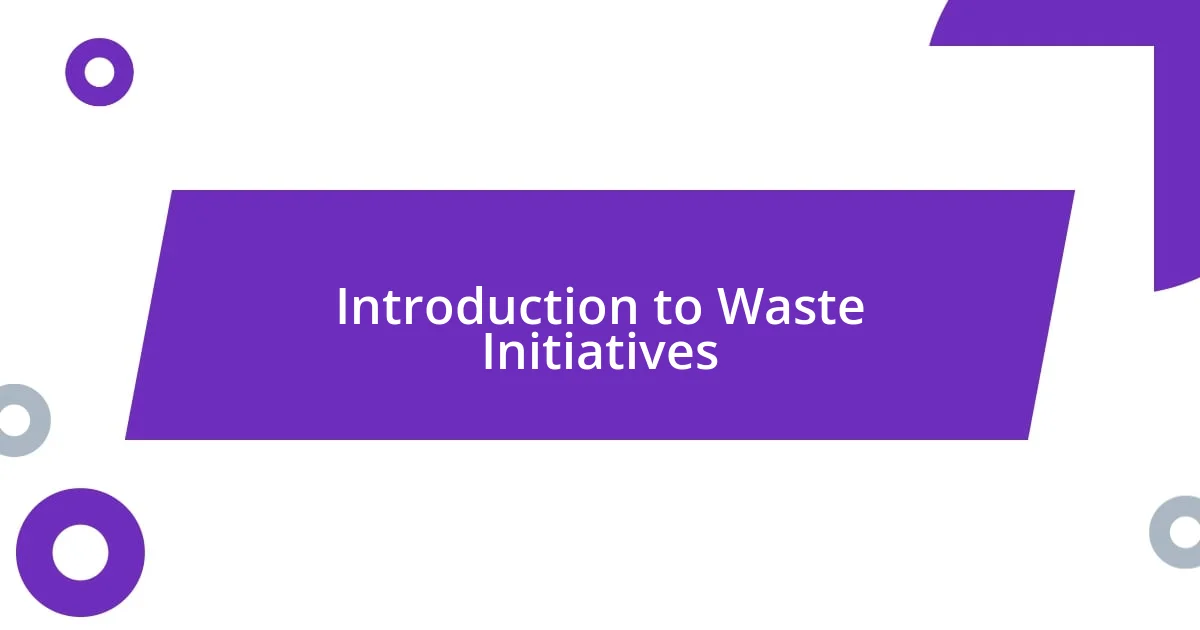
Introduction to Waste Initiatives
Waste initiatives are essential efforts aimed at reducing waste production and promoting sustainable practices in our communities. Reflecting on my own experience, I remember the first time I participated in a local cleanup event; the sheer amount of litter scattered across the park shocked me. How can something so simple as a single piece of trash grow into a mountain of waste over time?
These initiatives range from community cleanups to educational campaigns about recycling and composting. I was amazed at the diverse backgrounds of the volunteers I met. Each person brought their passion and perspective, which truly highlighted the collective commitment to making a difference. Have you ever wondered how your small actions can ripple through your community?
The beauty of waste initiatives lies in their ability to connect individuals with shared goals, creating a sense of purpose and belonging. I vividly recall engaging with kids during a workshop on recycling; their bright-eyed curiosity reminded me that fostering environmental consciousness from a young age is crucial. Isn’t it heartening to think that through such small acts, we might inspire the next generation to protect our planet?
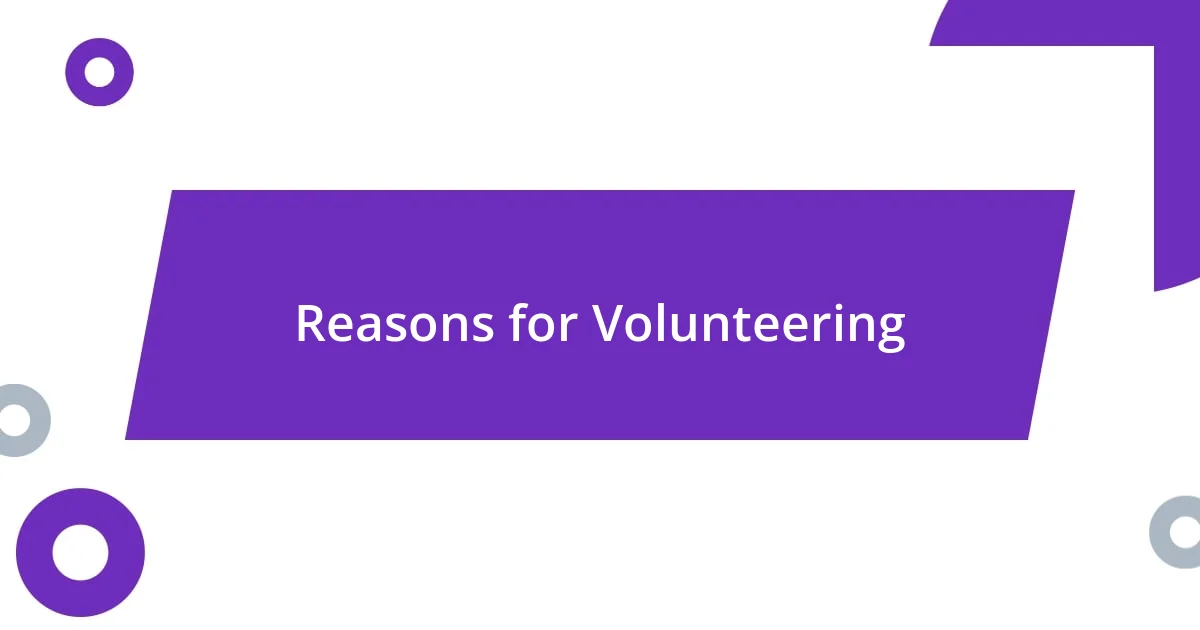
Reasons for Volunteering
Volunteering in waste initiatives has always felt like a deeply meaningful way for me to contribute to my community. One of the primary reasons I choose to volunteer is the opportunity to make a tangible impact. During one particular cleanup event, a little girl approached me, asking why I was picking up trash. When I explained that each piece removed helps protect wildlife and keeps our parks beautiful, her eyes lit up with understanding. It was a heartfelt reminder that when we share our knowledge, we empower others to care for our environment too.
Here are some compelling reasons that often inspire individuals to get involved:
- Sense of Community: Volunteering fosters connections and develops friendships with like-minded individuals who share a common goal.
- Personal Growth: Every event I participated in taught me new things, whether about waste management practices or teamwork.
- Environmental Responsibility: Contributing to waste initiatives deepens my appreciation for the planet and encourages sustainable habits in my daily life.
- Empowerment: Being part of a collective effort reinforces the idea that every small action contributes to a larger change, boosting my sense of agency.
- Joy of Service: There’s an indescribable joy in knowing that I’m part of something bigger, making the world a cleaner, greener place for generations to come.
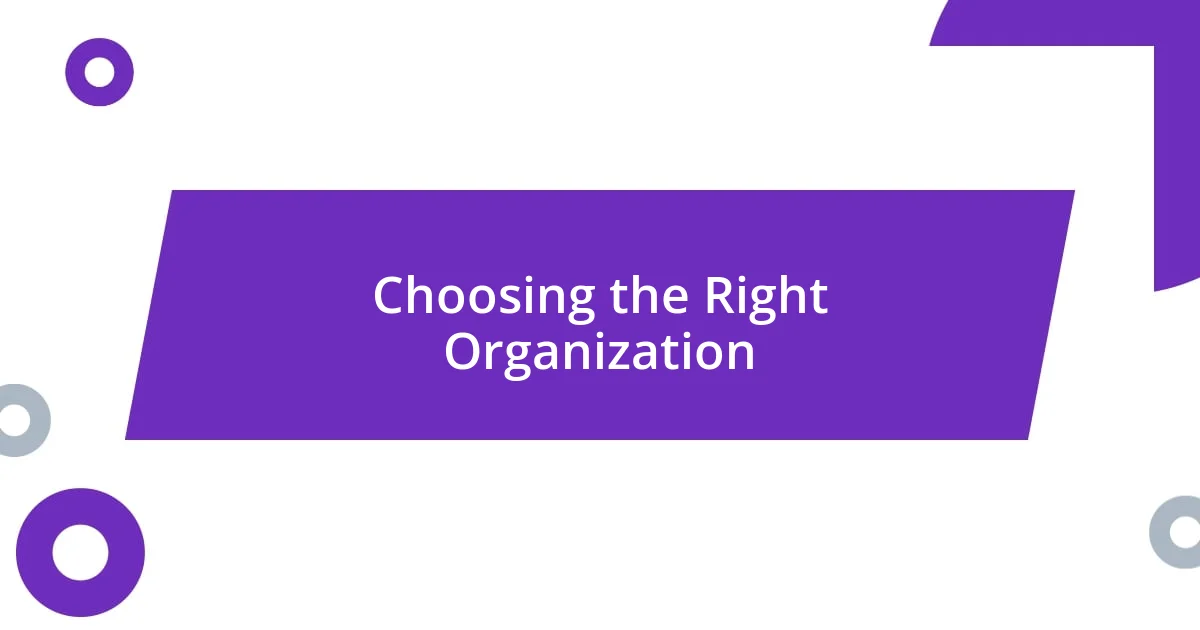
Choosing the Right Organization
Choosing the right organization for waste initiatives can truly shape your volunteering experience. I’ve found that aligning your values with those of the organization is crucial. For instance, I was once drawn to a group focused on beach cleanups because of my love for the ocean. However, I quickly learned their approach to marine conservation extended beyond just cleaning; they also educated the community on issues like plastic pollution. This holistic approach resonated with me deeply, making my time with them even more rewarding.
It’s also important to consider the organization’s reputation and the type of projects they undertake. I recall volunteering with a less established group for a city-wide recycle rally. While the enthusiasm was palpable, the lack of organization meant we struggled to make an impact. In contrast, my experience with a well-established nonprofit during a waste audit was incredibly fulfilling. They had a structured plan and clear goals, which made it easy for us to see the difference we were making.
Lastly, don’t underestimate the importance of your personal connection with the organization’s mission. I once had a chat with a founder of a local composting group, and her passion was contagious. It inspired me to dig deeper into waste reduction strategies and helped me form lasting relationships with fellow volunteers who shared that zeal. If you feel a genuine connection to the cause, it can transform your efforts into a truly fulfilling journey.
| Criteria | Example Organization |
|---|---|
| Mission Alignment | Ocean Conservancy |
| Reputation | Keep America Beautiful |
| Community Engagement | Compost Coalition |
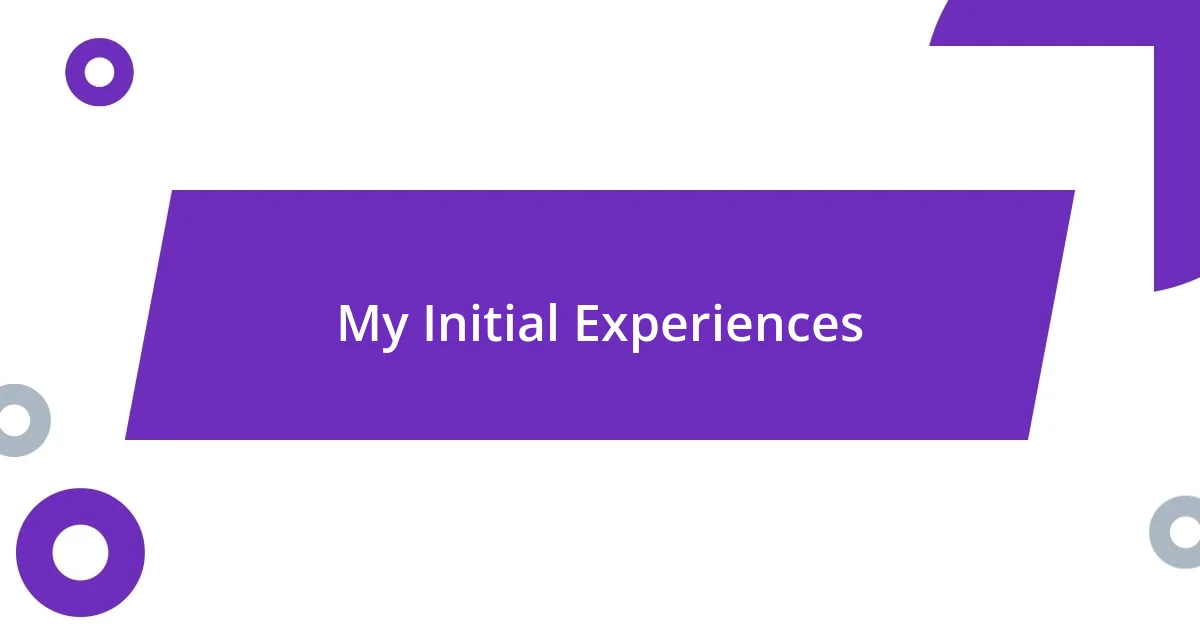
My Initial Experiences
My first experience volunteering in a waste initiative was a revelation. I remember showing up at the local park, not quite knowing what to expect. As we gathered, I felt a mix of excitement and nervousness. When we started picking up litter, I was surprised at how quickly the transformation happened. A cluttered, uninviting area gradually became a cleaner, more welcoming space. It struck me how such small actions could lead to such significant changes.
One moment stands out in my memory. While sorting recyclable materials at an event, I overheard a fellow volunteer share her story about how her family’s commitment to recycling evolved over time. Hearing her passion reminded me that personal experiences and growth often inspire others. It also made me reflect on how deeply entrenched our habits can be and how volunteering can nudge us toward more sustainable choices. Isn’t it fascinating how shared experiences can ignite passion in others?
As I continued volunteering, I discovered a profound sense of fulfillment that I hadn’t anticipated. There was this one day during a community cleanup when a local resident stopped to thank us and shared how our efforts diminished litter in her neighborhood. Her gratitude was infectious, filling the air with joy. It made me realize that involvement in these initiatives creates ripples of change, touching lives far beyond our immediate circle. Reflecting on these initial experiences, I can’t help but feel that volunteering is not just about the tasks we perform; it’s about the relationships we build and the community we foster along the way.
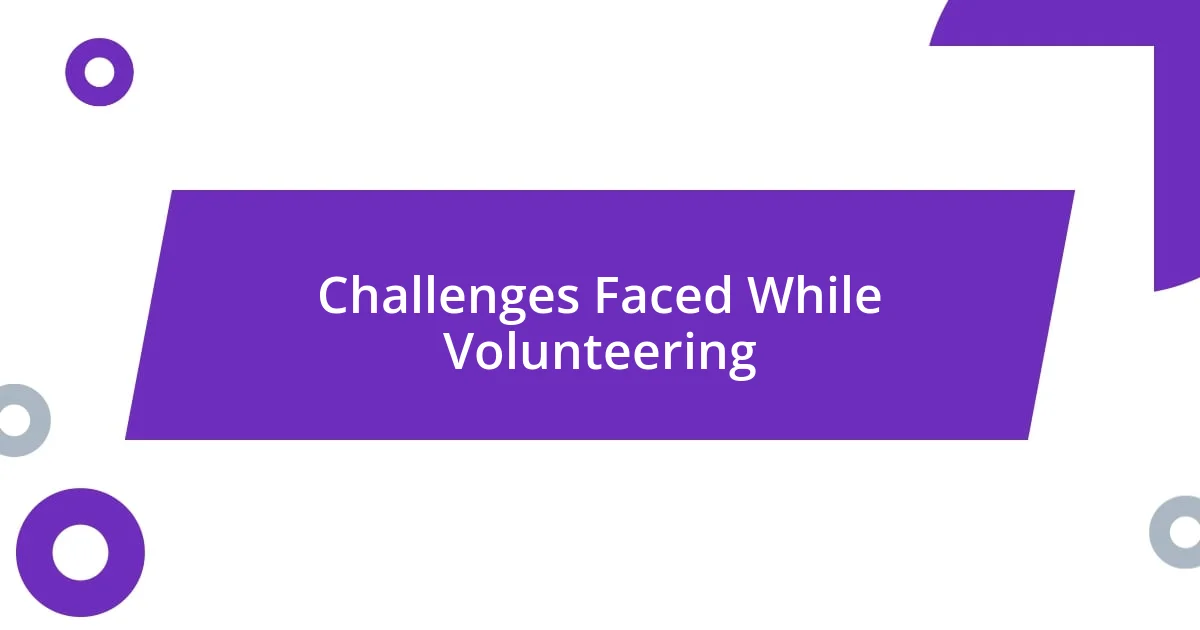
Challenges Faced While Volunteering
While volunteering in waste initiatives, I faced a few unexpected challenges that tested my commitment. One Saturday, I joined a local team for a major cleanup event, but it quickly became clear that the weather had other plans—heavy rain turned our ambitious day into a muddy mess. It was disheartening to see our efforts washed away, and I caught myself wondering if our work was in vain. Yet, that experience taught me resilience; even amidst setbacks, we can bond as a team and find joy in the shared struggles.
Another notable challenge was managing differing opinions within our volunteer group. I distinctly recall a disagreement at a planning meeting about whether we should focus more on education over cleanup efforts. It felt like a mini-debate, with each side holding strong convictions. Initially, the tension made me uncomfortable. However, I learned that these discussions, while challenging, could foster deeper understanding and ultimately strengthen our approach. Isn’t it interesting how conflicting views can lead to better strategies if we’re willing to listen and collaborate?
Additionally, the emotional toll of witnessing the sheer volume of waste humans generate was a reality check. During one event, while collecting trash at a beach, I stumbled upon items that highlighted our throwaway culture—plastic bottles, wrappers, even a discarded toy. Each piece reminded me of the impact we have on the environment, and I found myself grappling with frustration and sadness. Yet, this emotional intensity fuels my passion for change; it’s precisely these feelings that motivate us to strive for a cleaner, healthier planet.
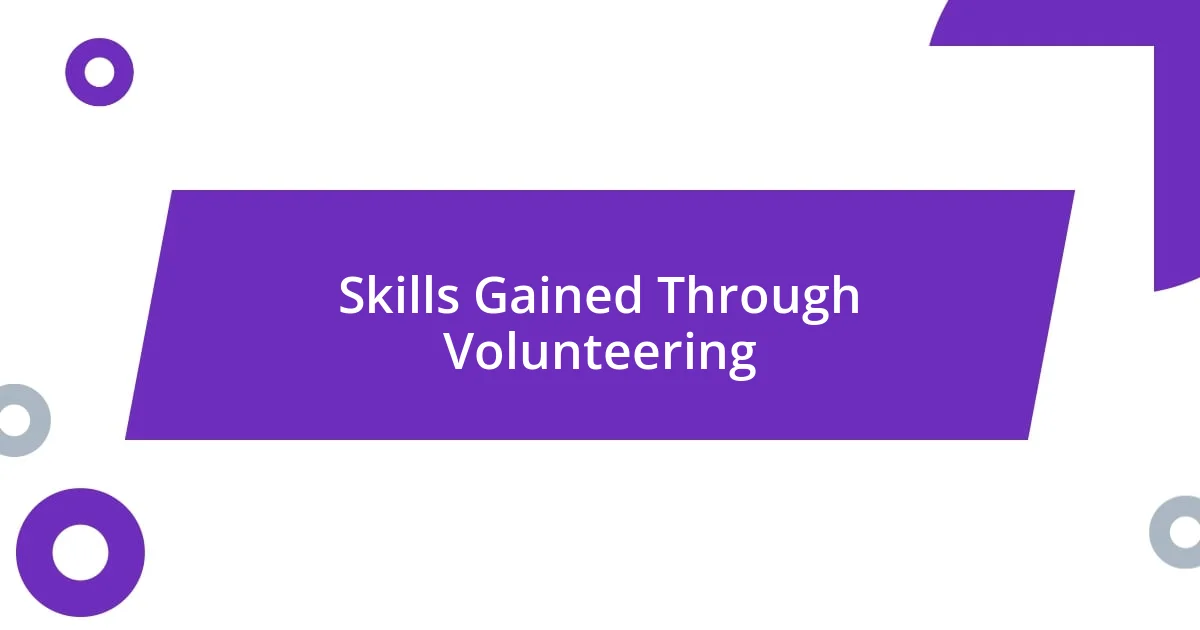
Skills Gained Through Volunteering
Volunteering not only helped the environment, but it also equipped me with some invaluable skills. For instance, I developed a keen sense of teamwork that I didn’t fully appreciate before. When we picked up trash in large groups, it was fascinating to see how each person’s unique abilities contributed to the overall success of our mission. I recall one day when we were sorting recyclables; a few volunteers had extensive knowledge about what could be recycled and what couldn’t. I found myself asking questions and absorbing information, which made me realize how sharing expertise can boost the group’s efficiency. Isn’t it empowering to learn from those around us?
Moreover, time management became a skill I didn’t expect to cultivate during my volunteer work. I vividly remember a day spent organizing an awareness campaign where everything had to run like clockwork. From setting up booths to scheduling talks, it felt like a race against the clock. Balancing all the tasks made me more aware of the importance of prioritizing my activities. Suddenly, I was able to dissect what needed my immediate attention and what could wait. Have you ever experienced that rush of clarity when you’re pressed for time?
Lastly, I honed my communication skills in a way that directly impacted my community. Engaging with locals during cleanup efforts and sharing the benefits of reduction and recycling was both rewarding and eye-opening. I realized how vital it is to convey messages in ways that resonate with different audiences. That experience taught me that effective communication is not just about talking—it’s about listening and adapting. It felt incredibly fulfilling when a fellow volunteer and I sparked an animated discussion with a passerby about sustainable practices. Knowing that we inspired someone to rethink their waste habits made my heart swell with pride.
